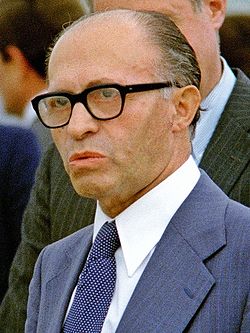| Position | Person | Party |
|---|
| Prime Minister | Menachem Begin | | Likud |
| Deputy Prime Minister | Simha Erlich (until 19 June 1983) [a] | | Likud |
| David Levy (from 3 November 1981) | | Likud |
| Minister of Agriculture | Simha Erlich (until 19 June 1983) [a] | | Likud |
| Menachem Begin | | Likud |
| Minister of Communications | Mordechai Tzipori | | Likud |
| Minister of Defense | Ariel Sharon (until 14 February 1983) | | Likud |
| Menachem Begin (14–23 February 1983) | | Likud |
| Moshe Arens (from 23 February 1983) | | Not an MK [b] |
Minister of Economics and
Inter-Ministry Co-ordination | Ya'akov Meridor | | Likud |
| Minister of Education and Culture | Zevulun Hammer | | National Religious Party |
| Minister of Energy and Infrastructure | Yitzhak Berman (until 30 September 1982) [c] | | Likud |
| Yitzhak Moda'i (from 19 October 1982) | | Likud |
| Minister of Finance | Yoram Aridor | | Likud |
| Minister of Foreign Affairs | Yitzhak Shamir | | Likud |
| Minister of Health | Eliezer Shostak | | Likud |
| Minister of Housing and Construction | David Levy | | Likud |
| Minister of Immigrant Absorption | Aharon Abuhatzira (until 4 May 1982) [d] | | Tami |
| Aharon Uzan (from 4 May 1982) | | Tami |
| Minister of Industry and Trade | Gideon Patt | | Likud |
| Minister of Internal Affairs | Yosef Burg | | National Religious Party |
| Minister of Justice | Moshe Nissim | | Likud |
| Minister of Labour and Social Welfare | Aharon Abuhatzira (until 2 May 1982) [d] | | Tami |
| Aharon Uzan (from 3 May 1982) | | Tami |
| Minister of Religious Affairs | Yosef Burg | | National Religious Party |
| Minister of Science and Development | Yuval Ne'eman (from 26 July 1982) | | Tehiya |
| Minister of Tourism | Gideon Patt (until 11 August 1981) | | Likud |
| Avraham Sharir (from 1 August 1981) | | Likud |
| Minister of Transportation | Haim Corfu | | Likud |
| Minister without Portfolio | Yitzhak Moda'i (until 19 October 1982) | | Likud |
| Mordechai Ben-Porat (from 5 July 1982) | | Telem, Movement for the Renewal of Social Zionism |
| Ariel Sharon (from 14 February 1982) | | Likud |
| Sarah Doron (from 5 July 1983) | | Likud |
| Deputy Minister in the Prime Minister's Office | Dov Shilansky | | Likud |
| Deputy Minister of Agriculture | Michael Dekel | | Likud |
| Pesach Grupper | | Likud |
| Deputy Minister of Defense | Mordechai Tzipori | | Likud |
| Deputy Minister of Education and Culture | Miriam Glazer-Ta'asa | | Likud |
| Deputy Minister of Finance | Haim Kaufman (from 28 August 1981) | | Likud |
| Deputy Minister of Housing and Construction | Moshe Katsav | | Likud |
| Deputy Minister of Immigrant Absorption | Aharon Uzan (until 5 May 1982) | | Tami |
| Deputy Minister of Labour and Social Welfare | Ben-Zion Rubin | | Tami |
| Deputy Minister of Religious Affairs | Haim Drukman (until 2 March 1982) | | National Religious Party |
| Deputy Minister of Transportation | David Shiffman (until 18 October 1982) [a] | | Likud |
